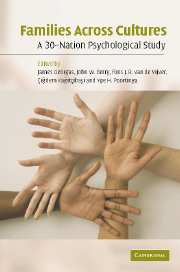Book contents
- Frontmatter
- Contents
- List of figures
- List of tables
- List of contributors
- Acknowledgments
- Prologue
- Part I
- Part II
- 9 The Algerian family: change and solidarity
- 10 Botswana
- 11 The Brazilian jeitinho: Brazil's sub-cultures, its diversity of social contexts, and its family structures
- 12 Britain
- 13 Bulgaria: socialism and open-market economy
- 14 Canada
- 15 Chile: new bottle, old wine
- 16 Cyprus
- 17 Portrait of family in France
- 18 Georgia
- 19 Germany: continuity and change
- 20 Ghana
- 21 Greece
- 22 Hong Kong, SAR China: transitions and return to the motherland
- 23 India
- 24 Indonesia: traditional family in a changing society
- 25 The Iranian family in a context of cultural diversity
- 26 Japan: tradition and change in the Japanese family
- 27 Mexico
- 28 Mongolia: traditions and family portrait
- 29 The Netherlands: tolerance and traditionalism
- 30 Nigeria
- 31 Pakistan: culture, community, and filial obligations in a Muslim society
- 32 The Saudi society: tradition and change
- 33 The South African family
- 34 South Korea
- 35 Spain: tradition and modernity in family structure and values
- 36 Turkey
- 37 Ukraine
- 38 Family in the United States: social context, structure, and roles
- Appendix
- References
- Index
17 - Portrait of family in France
Published online by Cambridge University Press: 10 December 2009
- Frontmatter
- Contents
- List of figures
- List of tables
- List of contributors
- Acknowledgments
- Prologue
- Part I
- Part II
- 9 The Algerian family: change and solidarity
- 10 Botswana
- 11 The Brazilian jeitinho: Brazil's sub-cultures, its diversity of social contexts, and its family structures
- 12 Britain
- 13 Bulgaria: socialism and open-market economy
- 14 Canada
- 15 Chile: new bottle, old wine
- 16 Cyprus
- 17 Portrait of family in France
- 18 Georgia
- 19 Germany: continuity and change
- 20 Ghana
- 21 Greece
- 22 Hong Kong, SAR China: transitions and return to the motherland
- 23 India
- 24 Indonesia: traditional family in a changing society
- 25 The Iranian family in a context of cultural diversity
- 26 Japan: tradition and change in the Japanese family
- 27 Mexico
- 28 Mongolia: traditions and family portrait
- 29 The Netherlands: tolerance and traditionalism
- 30 Nigeria
- 31 Pakistan: culture, community, and filial obligations in a Muslim society
- 32 The Saudi society: tradition and change
- 33 The South African family
- 34 South Korea
- 35 Spain: tradition and modernity in family structure and values
- 36 Turkey
- 37 Ukraine
- 38 Family in the United States: social context, structure, and roles
- Appendix
- References
- Index
Summary
A HISTORICAL OUTLINE OF FRANCE
The French Republic is a Western European country bordered by the countries of Belgium, Germany, Switzerland, Italy, and Spain, and by mountains (Alps and Pyrenees) and oceans (Atlantic and Mediterranean). Its population is around 60 million, with its capital, Paris, having around 2 million inhabitants and with around 11 million living in the capital region (Encyclopédie Hachette Multimedia 99, 1999). Around 1850, three-quarters of the population was rural; by 1934 it was 50 percent and is now mostly urban or suburban (Encyclopédie Microsoft Encarta en ligne, 2005).
France covers 550,000 km2, and is divided into 22 regions and 96 departments. There are also 120 overseas possessions, some of which are an integral part of France (departments), while others are territories. Families in the overseas departments and territories are more vulnerable and fragile than in Metropolitan France. The present description of the French family is limited to metropolitan France (i.e., in Europe). Nevertheless in metropolitan France there are large variations in family structure and culture by region, urbanization, and religion.
The present borders of France were largely fixed by the fourteenth century. Prior to that, many groups came together to form the French people, including Gallo-Romans, and “barbarian” invasions from the east and north. Starting with Clovis (481–511, King of the Franks), Roman Catholicism and the French language served as unifying forces.
- Type
- Chapter
- Information
- Families Across CulturesA 30-Nation Psychological Study, pp. 311 - 318Publisher: Cambridge University PressPrint publication year: 2006
- 2
- Cited by



